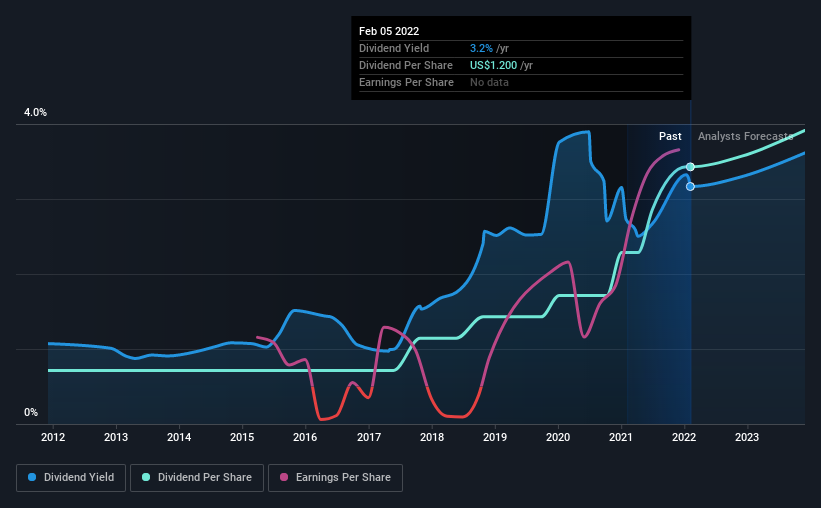Jefferies Financial Group Inc. (NYSE:JEF) is about to trade ex-dividend in the next 4 days. The ex-dividend date occurs one day before the record date which is the day on which shareholders need to be on the company's books in order to receive a dividend. The ex-dividend date is an important date to be aware of as any purchase of the stock made on or after this date might mean a late settlement that doesn't show on the record date. Thus, you can purchase Jefferies Financial Group's shares before the 11th of February in order to receive the dividend, which the company will pay on the 25th of February.
The company's upcoming dividend is US$0.30 a share, following on from the last 12 months, when the company distributed a total of US$1.20 per share to shareholders. Looking at the last 12 months of distributions, Jefferies Financial Group has a trailing yield of approximately 3.2% on its current stock price of $37.9. We love seeing companies pay a dividend, but it's also important to be sure that laying the golden eggs isn't going to kill our golden goose! So we need to investigate whether Jefferies Financial Group can afford its dividend, and if the dividend could grow.
If a company pays out more in dividends than it earned, then the dividend might become unsustainable - hardly an ideal situation. Jefferies Financial Group paid out just 14% of its profit last year, which we think is conservatively low and leaves plenty of margin for unexpected circumstances.
Generally speaking, the lower a company's payout ratios, the more resilient its dividend usually is.
Click here to see the company's payout ratio, plus analyst estimates of its future dividends.

Have Earnings And Dividends Been Growing?
Businesses with strong growth prospects usually make the best dividend payers, because it's easier to grow dividends when earnings per share are improving. If earnings decline and the company is forced to cut its dividend, investors could watch the value of their investment go up in smoke. It's encouraging to see Jefferies Financial Group has grown its earnings rapidly, up 50% a year for the past five years.
The main way most investors will assess a company's dividend prospects is by checking the historical rate of dividend growth. Jefferies Financial Group has delivered 17% dividend growth per year on average over the past 10 years. It's exciting to see that both earnings and dividends per share have grown rapidly over the past few years.
The Bottom Line
Is Jefferies Financial Group an attractive dividend stock, or better left on the shelf? When companies are growing rapidly and retaining a majority of the profits within the business, it's usually a sign that reinvesting earnings creates more value than paying dividends to shareholders. This is one of the most attractive investment combinations under this analysis, as it can create substantial value for investors over the long run. Overall, Jefferies Financial Group looks like a promising dividend stock in this analysis, and we think it would be worth investigating further.
On that note, you'll want to research what risks Jefferies Financial Group is facing. Case in point: We've spotted 1 warning sign for Jefferies Financial Group you should be aware of.
If you're in the market for dividend stocks, we recommend checking our list of top dividend stocks with a greater than 2% yield and an upcoming dividend.
Have feedback on this article? Concerned about the content? Get in touch with us directly. Alternatively, email editorial-team (at) simplywallst.com.
This article by Simply Wall St is general in nature. We provide commentary based on historical data and analyst forecasts only using an unbiased methodology and our articles are not intended to be financial advice. It does not constitute a recommendation to buy or sell any stock, and does not take account of your objectives, or your financial situation. We aim to bring you long-term focused analysis driven by fundamental data. Note that our analysis may not factor in the latest price-sensitive company announcements or qualitative material. Simply Wall St has no position in any stocks mentioned.
The views and opinions expressed herein are the views and opinions of the author and do not necessarily reflect those of Nasdaq, Inc.


